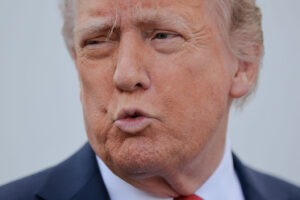The Changing Landscape of U.S. Election Security: A Closer Look at Recent Developments
Amidst a series of legal challenges and public scrutiny, President Donald Trump’s recent actions regarding election security have sparked significant debate. While his March executive order on elections is just one part of his administration’s broader approach, it has brought several covert efforts into the spotlight. These efforts aim to dismantle the federal framework established over the past decade to support state-level election security.
Last week, a new directive from President Trump targeted Christopher Krebs, the former head of the Cybersecurity and Infrastructure Agency (CISA), initiating a Department of Justice review of his actions. Krebs had previously been instrumental in securing the 2020 election, yet the president’s memorandum now accuses him of misconduct, creating a potentially dangerous precedent for government officials tasked with maintaining election integrity.
The Role of Federal Agencies in Election Security
The federal government has traditionally played a critical role in supporting state and local election officials in safeguarding electoral infrastructure. This includes components such as voter registration databases, polling equipment, and voting locations. In 2017, the Department of Homeland Security designated election infrastructure as critical, providing access to enhanced cybersecurity measures.
Established in 2018, CISA’s mission is to protect critical infrastructure from physical and cyber threats. Alongside CISA, other federal entities like the Office of the Director of National Intelligence and the FBI offer vital support through intelligence sharing and threat response, while the Department of Justice’s Election Threats Task Force addresses violence against election workers.
Trump Administration’s Shift in Election Security Support
The current administration has made significant cuts in federal support for election security, impacting four key areas.
Cybersecurity Support
CISA’s role in providing cybersecurity services to election offices has been notably reduced. In 2023 and 2024, CISA completed over 700 cybersecurity assessments, but an internal review led to a freeze on these activities, with no public disclosure of the findings. Additionally, the agency experienced a loss of expertise with the dismissal of about 130 employees, including election security advisers.
Physical Security Support
CISA has also curtailed its support for physical security, previously offering assessments and resources to secure election sites. These efforts were crucial in mitigating threats during the 2024 election, such as bomb threats and arson attacks on ballot drop boxes.
Information Sharing
Effective communication between federal, state, and local entities is vital for election security. However, recent funding cuts to the Election Infrastructure Information Analysis Center and the Multi-State Information and Analysis Center have hindered this critical function. The discontinuation of the Critical Infrastructure Partnership Advisory Council further limits the exchange of threat intelligence.
Foreign Interference Deterrence
The capacity to counter foreign cyber threats has been significantly reduced. Despite warnings from the Office of the Director of National Intelligence and FBI about threats from countries like China, Iran, and Russia, the federal government’s role in addressing these challenges has diminished.
Potential for Continued Reductions
Future cuts to federal election security support may be on the horizon. The Project 2025 policy agenda outlines a plan for restructuring key agencies involved in election security. The breadth of actions described suggests that further reductions may occur, exacerbating challenges faced by state and local election officials.
Impact on Election Officials
The cuts have strained relationships between election officials and federal agencies. Uncertainty about the extent of these reductions complicates planning for upcoming elections, particularly in states like Arizona and Pennsylvania. Arizona Secretary of State Adrian Fontes expressed concerns about operating “blind” without CISA’s assistance, while Pennsylvania’s Secretary of State Al Schmidt warned of “serious consequences” in a letter to Defense Secretary Kristi Noem.
President Trump’s executive order further complicates matters by altering federal guidelines for voting machines without adhering to required legal processes, a move currently challenged in court.
State-Level Initiatives for Election Protection
In light of reduced federal involvement, states and civil society must bolster election security efforts. This includes increasing funding, enhancing cybersecurity and physical security practices, and improving information sharing mechanisms. With midterm elections approaching, proactive measures are essential to ensure electoral integrity.






